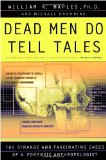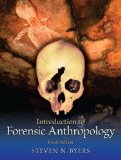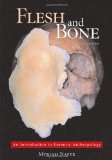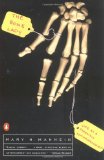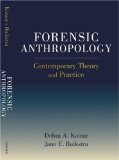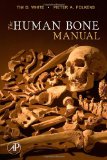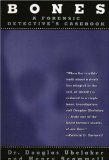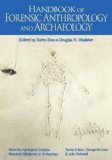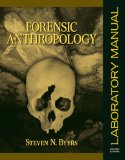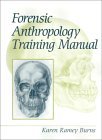Dead
Men Do Tell Tales: The Strange and Fascinating Cases of a Forensic Anthropologist
by William R. Maples, Michael Browning
Paperback from Broadway
Media Published: 1995-
ISBN: 0385479689
From a skeleton, a skull, a mere fragment of burnt thighbone, Dr. William
Maples can deduce the age, gender, and ethnicity of a murder victim, the
manner in which the person was dispatched, and, ultimately, the identity
of the killer. In Dead Men Do Tell Tales, Dr. Maples revisits his
strangest, most interesting, and most horrific investigations, from the
baffling cases of conquistador Francisco Pizarro and Vietnam MIAs to the
mysterious deaths of President Zachary Taylor and the family of Czar Nicholas
II. |
| |
Introduction
to Forensic Anthropology (4th Edition) (Pearson Custom Anthropology)
by Steven N. Byers
Hardcover from Prentice Hall
ISBN: 0205790127
Comprehensive and engaging, Byers's Introduction
to Forensic Anthropology, 4e uses thoughtful pedagogy to lead students
step-by-step through the most current and detailed forensic anthropology
material available today.
This one-of-a-kind text offers comprehensive coverage
of all of the major topics in the field of forensics with accuracy, intensity,
and clarity. Extensive illustrations and photos ensure that the text is
accessible for students.
As one reviewer says, "there is no other source
available that is so comprehensive in its coverage of the methods and issues
in the current practice of forensic anthropology." |
| |
Flesh
and Bone: An Introduction to Forensic Anthropology
by Myriam Nafte
Paperback from Carolina Academic Press
ISBN: 1594603006
Flesh and Bone: An Introduction to Forensic Anthropology offers the
reader a solid background in forensic anthropology by out- lining some
of the methods and procedures that best define the discipline. It introduces
readers to the rapidly growing area known as forensic science, providing
a comprehensive look at many of the participants in the field. Nafte avoids
technical terminology whenever possible and includes photographs, charts,
and illustrations to complement the text.
The book evolves sequentially, beginning with a discussion of all things
forensic and then continuing to detail the broad field of anthropology,
the process of death, decomposition, and skeletonization. Methods of identifying
the human skeleton, DNA analysis, and the reconstruction of identity are
highlighted. The final chapter deals with the modern application of forensic
anthropology to human rights missions. |
| |
The
Bone Lady: Life as a Forensic Anthropologist
by Mary H. Manheim
Paperback from Penguin (Non-Classics)
Media Published: 2000-
ISBN: 014029192X
When a skeleton is all that's left to tell the story of a crime, Mary
H. Manhein, otherwise known as "the bone lady," is called in. For almost
two decades, Manhein has used her expertise in forensic pathology to help
law enforcement agents--locally, nationally, and internationally--solve
their most perplexing mysteries. She shares the extraordinary details of
the often high-profile cases on which she works, and the science underlying
her analyses. Here are Civil War skeletons, cases of alleged voodoo and
witchcraft, crimes of political intrigue, and the before-and-after of facial
reconstruction.
Written with the compassion and humor of a born storyteller, The Bone
Lady is an unforgettable glimpse into the lab where one scientist works
to reveal the human stories behind the remains.
"Whether reporting the stench, suffocating heat, or brutal sorties
by biting insects in steamy bayous . . . Manheim is at once straightforward
and appropriately droll. . . . She teaches us a great deal, often puncturing
popular misconceptions." --Book Page
"A subtly creepy collection of stories . . . A rare, effective blend
of entertainment and education." --Kirkus Reviews |
| |
Forensic
Anthropology: Contemporary Theory and Practice
by Debra Komar, Jane Buikstra
Hardcover from Oxford University Press, USA
ISBN: 0195300297
Forensic anthropology is a vastly popular and rapidly changing profession,
yet to date there has been no volume that reflects the current state of
the discipline and forecasts its future. The first comprehensive text in
the field, Forensic Anthropology: Contemporary Theory and Practice
examines the medical, legal, ethical, and humanitarian issues associated
with forensic anthropology, current forensic methods, and bio-historical
investigations.
Forensic Anthropology offers a unique synthesis of theoretical
and methodological coverage. Rather than simply describing methodology,
Komar and Buikstra place forensic anthropology in the broader context of
medico-legal death investigations, critically evaluating practical techniques
in a scientific framework and detailing the anthropologist's role in relation
to both law enforcement and the medical examiner or coroner. The authors
review the current state of the field, emphasizing recent changes to the
judicial guidelines regarding the admissibility of scientific evidence
in court. They highlight the impact of these rulings, the increased need
for scientific rigor, and the evolving nature of anthropological studies,
preparing students to function effectively in the demanding judicial system
that will evaluate their work in the future. The text also stresses the
vital importance of research in the development of forensic applications
of anthropology.
Forensic Anthropology is enhanced by numerous illustrative case
studies and more than ninety photos and illustrations that help to deepen
and enrich students' understanding of the material. Coauthored by a top
authority in forensic anthropology and an anthropologist whose fieldwork
has included medico-legal death investigation in Bosnia, Kosovo, Iraq,
and Darfur, this volume is an in-depth and indispensable guide to the dynamic
and rapidly professionalizing field of forensic anthropology. |
| |
The
Human Bone Manual
by Tim D. White, Pieter A. Folkens
Paperback from Academic Press
Published: 2005-
ISBN: 0120884674
Building on the success of their previous book, White and Folkens'
The
Human Bone Manual is intended for use outisde the laboratory and classroom,
by professional forensic scientists, anthropologists and researchers. The
compact volume includes all the key information needed for identification
purposes, including hundreds of photographs designed to show a maximum
amount of anatomical information.
* Features more than 500 color photographs and illustrations in a portable
format; most in 1:1 ratio
* Provides multiple views of every bone in the human body
* Includes tips on identifying any human bone or tooth
* Incorporates up-to-date references for further study |
| |
Bones:
A Forensic Detective's Casebook
by Henry Scammell, Dr. Douglas Ubelaker
Paperback from M.Evans & Company
ISBN: 0871319047
Fascinating, educational, and highly readable, Bones takes readers
into the dark world of forensic science. |
| |
|
HANDBOOK
OF FORENSIC ANTHROPOLOGY AND ARCHAEOLOGY (World Archaeological Congress
Research)
Hardcover from Left Coast Press
ISBN: 1598740741
Over the last 10 years interest
in the disciplines of forensic anthropology and archaeology has exploded.
In order to provide archaeologists and their students with a reliable understanding
of these disciplines, this authoritative volume draws contributions from
fifty experienced practitioners from around the world to offer a solid
foundation in both the practical and ethical components of forensic work.
Over 40 chapters weave together historical development, current field methods
in analyzing crime, natural disasters and human atrocities, an array of
laboratory techniques, key case studies, legal, professional, and ethical
issues, and promising future directions, all from a global perspective.
This volume will be the benchmark for the understanding of anthropological
and archaeological forensics for years to come. |
| |
Forensic
Anthropology Laboratory Manual (2nd Edition)
by Steven N. Byers
Paperback from Allyn & Bacon
ISBN: 0205532365
Designed to accompany Introduction to Forensic
Anthropology: A Textbook, Third Edition by Byers (Allyn & Bacon,
2007) this laboratory manual provides students in academic laboratory courses
hands-on experience with the major processes of forensic anthropology.
This unique, step-by-step workbook introduces students to all the procedures
of the forensic anthropology protocol while providing even, balanced coverage
of the core topics. Tear-out exercise worksheets reinforce the methodologies
of forensic anthropology and enhance student comprehension. Each chapter
contains detailed explanations of the terminology, osteological features,
and measurements needed to understand each of the topics covered. Chapters
may be covered in one session or multiple sessions and lists of basic and
optional lab materials are provided in chapter openers, enabling instructors
to tailor each lab to the resources available. Helpful notes to instructors
are provided at the end of each chapter. |
| |
Death's
Acre: Inside the Legendary Forensic Lab/the Body Farm/Where the Dead Do
Tell Tales
by William M. Bass, Jon Jefferson, Bill Bass
Book Description:
A pioneer of modern forensic anthropology reveals secrets of the world's
first-and only-laboratory devoted to death.
Forensic science and murder investigations are among the most fascinating
topics of our time. Dominating television and print media every season,
both as fiction and nonfiction, the subject could not be hotter. As one
of the world's leading forensic anthropologists, Dr. Bill Bass is the premier
guide to this unusual world.
Nowhere is there another lab like Dr. Bass's: on a hillside in Tennessee,
human bodies decompose in the open air, aided by insects, bacteria, and
birds, unhindered by coffins or mausoleums. At the "Body Farm," nature
takes its course with corpses buried in shallow graves, submerged in water,
locked in trunks of cars. As scientific stand-ins for murder victims, they
serve the needs of science-and the cause of justice.
For thirty years, Dr. Bass's research has revolutionized the field of
forensic science, particularly by pinpointing "time since death" in murder
cases. In his riveting book, he investigates real cases and leads readers
on an unprecedented journey behind the locked gates of the "Body Farm."
A master scientist and engaging storyteller, Bass shares his most intriguing
cases: his revisit of the Lindbergh kidnapping and murder fifty years later;
the mystery of a headless corpse, whose identity astonished police; the
telltale bugs that finally sent a murderous grandfather to death row-and
many more.
Hardcover from Putnam Pub Group
|
| |
Forensic
Anthropology Training Manual
by Karen Ramey Burns
This book focuses on the challenges and responsibilities of the forensic
scientist, the multidisciplinary nature of the work, and the international
potential for the forensic sciences. An excellent introduction to the realities
of the profession of forensic scientist. Trains in the description and
analysis of human skeletal and dental remains. Offers a well-illustrated
approach to osteology training, including: a concentration on vocabulary-building,
the use of case studies, and a structured approach to skeletal analysis
and report-writing. An excellent text for those considering the field of
forensic science. Amazon.com
Paperback: 282 pages
Prentice Hall; ISBN: 0130105767; 1 edition (January 6,
) |
| |
Forensic
Osteology : Advances in the Identification of Human Remains
by Kathleen J., Ph.D. Reichs (Editor), William M., Ph.D. Bass (Editor)
Special Order
Hard
Evidence: Case Studies in Forensic Anthropology
by Dawnie Wolfe Steadman
An essential addition to any forensics course, this volume of case
studies describes both innovative approaches and practical experiences
in this dynamic field. It provides students with a strong sense of the
types of cases with which forensic anthropologists become involved—as
well as their professional and ethical responsibilities—and
it demonstrates the truly multidisciplinary nature of the science. The
Publisher
Paperback from Prentice Hall
|
| |
Human
Osteology
by Tim D. White (Author), Michael T. Black (Author), Pieter A. Folkens
(Author)
A classic in its field, Human Osteology has been used by students and
professionals for nearly two decades. Now revised and updated for a third
edition, the book continues to build on its foundation of detailed photographs
and practical real-world application of science. New information, expanded
coverage of existing chapters, and additional supportive photographs keep
this book current and valuable for both classroom and field work.
Osteologists, archaeologists, anatomists, forensic scientists, and paleontologists
will all find practical information on accurately identifying, recovering,
and analysing and reporting on human skeletal remains and on making correct
deductions from those remains.
Forensic
Taphonomy
Edited by William Haglund and Marcella Sorg
Links have recently been established between the study of death assemblages
by archaeologists and paleontologists (taphonomy) and the application of
physical anthropology concepts to the medicolegal investigation of death
(forensic anthropology). Forensic Taphonomy explains these links in a broad-based,
multidisciplinary volume. It applies taphonomic models in modern forensic
contexts and uses forensic cases to extend taphonomic theories. Review
articles, case reports, and chapters on methodology round out this book's
unique approach to forensic science. Amazon.com
Hardcover: 672 pages
CRC Press; ISBN: 0849394341;
Forensic
Analysis of the Skull : Craniofacial Analysis, Reconstruction, and Identification
by Mehmet Yasar Iscan, Richard P. Helmer (Editor)
Hardcover: 258 pages
John Wiley & Sons; ISBN: 0471560782; 1st edition
(January 15, 1993)
Silent
Witness: How Forensic Anthropology Is Used to Solve the World's Toughest
Crimes
by Roxana Ferllini Timms, Cyril Wecht, Roxana Ferllini
Book Description:
"Bones have an uncanny knack of holding important clues as to the fate
of the individuals to whom they belonged."
As portrayed in mystery novels and more than nine television shows
including CSI: Crime Scene Investigation, American Justice and City Confidential,
forensic anthropologists work in an environment where the stakes are high,
the pressure is intense, and their findings are vital in criminal investigations.
It's a fascinating and often dramatic world.
Go behind the scenes with forensic anthropologists and learn about their
techniques, how they locate a body, how they carefully uncover evidence,
and how the unique characteristics of each body bears silent witness to
age, sex, cause of death and clues as to who or what was responsible.
With 29 real-life case studies and more than 350 color photographs and
illustrations, Silent Witness is a fascinating read for anyone interested
in the world of forensics.
Paperback from Firefly Books
|
| |
Stiff: The Curious Lives of Human Cadavers
by Mary Roach
Listed under Forensics
Written
in Bones: How Human Remains Unlock the Secrets of the Dead
by Paul G. Bahn
Book Description:
Written in Bones brings together a team of international experts to
show how the careful study of bones reveals a compelling picture of the
lives, cultures, and beliefs of ancient societies from around the world.
This compelling and scientifically-accessible book:
- Provides 38 case studies examining the discoveries at archeological
sites
- Introduces readers to ancient peoples
- Includes more than 350 color photographs
Human remains tell us much about how our ancestors lived and died. In
Written in Bones, significant discoveries are carefully brought together
and analyzed. Readers learn how experts use modern scientific techniques
to piece together the stories behind the bones. The data is used to create
a picture of cultures and ritual beliefs. There are such astonishing discoveries
as:
- Han Dynasty aristocrat preserved in an unknown red liquid
- Bog bodies in Europe
- The riddle of Tomb KV55 - where a male body was found inside a female
coffin
- World's oldest dwarf
- The headless men and giant wolves of the Mesolithic cemetery in Siberia
Paperback from Firefly Books
|
| |



